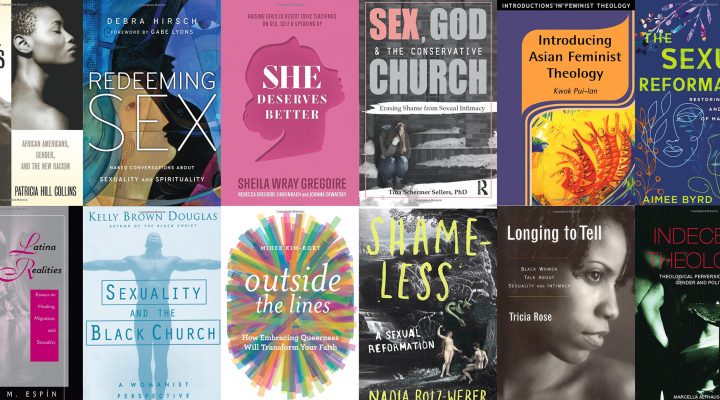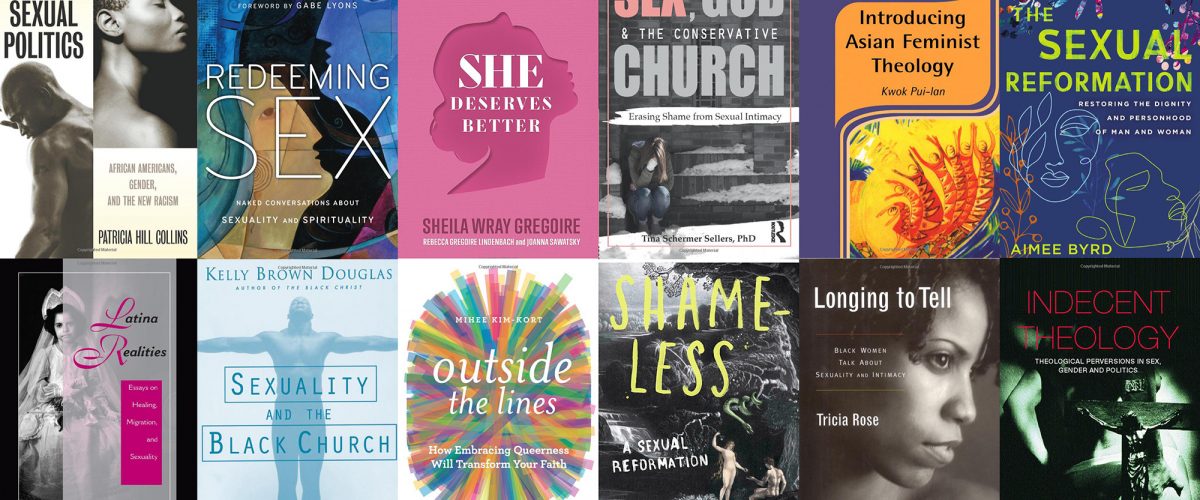The past few months have been marked by evangelical men writing about sexuality in ways that center their perspective and pleasure while ignoring the perspectives and pleasure of women.
In one interview about his controversial book, Josh Butler said he continues to see his theology of sexuality as “way more beautiful and compelling than anything else our culture has on offer.”
That begs the question: What else does our culture have to offer regarding Christian theologies of sexuality?
Taking the scholarship of women seriously
Despite the overwhelming focus on books and articles written by men, there are many resources about sexuality written by Christian women over the past 30 years from a wide variety of racial and theological perspectives.
The problem is not that women aren’t writing. It’s that conservative evangelical men aren’t paying attention to them.
After searching The Gospel Coalition, Desiring God, Grace to You, and the Council on Biblical Manhood and Womanhood, I could find just two quick negative references to the women I reference below. The majority of their engagement with scholarship by women is with Aimee Byrd.
Perhaps they feel more threatened by Byrd, given her knowledge of how they think due to her experience in the Orthodox Presbyterian Church and given how she would resonate with many of their readers due to her commitment to traditional sexual ethics. But for those who write from perspectives beyond where Byrd is willing to go, conservative evangelical men seem to act like their work doesn’t exist.
TGC and Mere Orthodoxy author Patrick Miller recently dismissed engaging with New Testament Scholar Laura Robinson’s review of Butler’s Beautiful Union book. He explained, “Laura comes to this dialogue with very different presuppositions than I do re: Christian sex ethics.” Miller said Robinson’s critiques “aren’t the kind of critiques I’m as interested in pursuing on my podcast (I am interested in the critiques of those who hold to a traditional Christian sex ethic).”
“The standards for women are on the moon in the church. For men they’re in the basement.”
Robinson responded, “Can you see why women are fed up? If a man writes a bad article, you must buy his book and keep your thoughts to yourself except to praise him. If a woman ever gets frustrated, you can read one sentence of hers out of context and use that to justify ignoring her forever. … The standards for women are on the moon in the church. For men they’re in the basement.”
Books about sexuality from racially and theologically diverse women
I have put together a list of classic and current books by women that should be taken seriously on this topic. Because these resources come from a variety of perspectives, they do not all share the same experiences or theological priorities. In fact, I have disagreements with some of these resources as well.
Of course, I can already hear the groaning of conservative white men saying human perspectives are irrelevant when the Bible has revealed objective, unchanging universal truth. But that knee-jerk reaction betrays the fact that they lack the awareness of how the Bible was written from culturally situated perspectives, and they lack the awareness of how culturally formed their interpretation is.
At least these women are aware and honest about the perspectives they are writing from.
It’s time we step out of our white male echo chambers and begin taking the perspectives of women seriously. As you’ll see, there is so much more complexity and depth in sexual ethics we can explore if we’re willing to listen and learn.
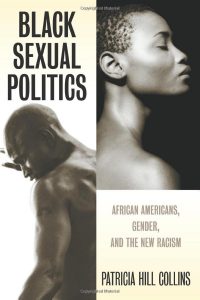
Black Sexual Politics: African Americans, Gender, and the New Racism
Author: Patricia Hill Collins
Publisher: Routledge (2005)
Collins has been a leader in Black feminist thought for nearly four decades. Examining how differences in penalty and privilege occur in gender, race and class, Collins says empowerment comes when people can “think and speak for themselves.” But as she reflects back through the journey of Black men and women since the 1960s, she notes how much has changed, especially through “gender-specific contours of racism.” She argues sexual politics affects how men and women perceive and treat one another across race and class contexts. And she analyzes how these dynamics have a “disproportionate impact on African Americans” to a degree that is more pressing today than ever.
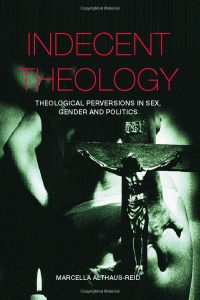 Indecent Theology: Theological Perversions in Sex, Gender and Politics
Indecent Theology: Theological Perversions in Sex, Gender and Politics
Author: Marcella Althaus-Reid
Publisher: Routledge (2000)
Writing the most provocative book in this list, Althaus-Reid brings together feminist liberation theology, sexual theory, postcolonial criticism, queer theory, Marxist studies, continental philosophy and systematic theology to dismantle the layers of economic and theological oppression in Latin America that shape assumptions about sexuality and decency. Althaus-Reid considers sexuality and struggle in the streets as a living metaphor for God and locates poverty and sensuality as points of exclusion and marginalization at great cost to urban poor women. This book is far outside the realm most conservative evangelicals ever would consider. But for those who are interested in conversations about justice and sexuality, it will help you empathize with your neighbor in ways you’ve never considered.
 Introducing Asian Feminist Theology
Introducing Asian Feminist Theology
Author: Kwok Pui-lan
Publisher: Sheffield Academic Press (2000)
Despite representing a huge slice of humanity, Asian women are rarely found writing about theology and have been engaging in theological publishing only since the late 1970s, Pui-lan says. They can be hesitant to embrace the term “feminism” due to how controversial it is in parts of Asia. And because there is so much diversity in Asian societies, there also are many different ways Asian women engage theology. So Pui-lan shares the background of multiple authors, deals with the socio-political, religio-cultural and post-colonial contexts they face, explains their sources, hermeneutics, concepts of God, and then applies this background to Asian women’s embodiment and sexuality.
 Latina Realities: Essays on Healing, Migration, and Sexuality
Latina Realities: Essays on Healing, Migration, and Sexuality
Author: Oliva Espin
Publisher: Routledge (1997)
In this collection of essays written between 1984 and 1996, Espin discusses the impact of social forces like migration on women’s psychological development and experiences of sexuality. The struggle between an individual’s desire and the power balances of society push and pull on one another. And the narrative of life stories shifts as abrupt changes in culture occur through “revolutions, war, migration, peace accords and earthquakes or other natural phenomena.” As women migrate over geographical borders, they find themselves reflecting on their sexual identity borders as well.
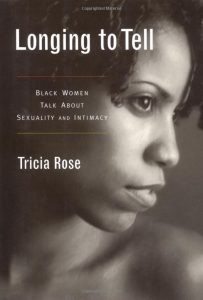 Longing to Tell: Black Women’s Stories of Sexuality and Intimacy
Longing to Tell: Black Women’s Stories of Sexuality and Intimacy
Author: Tricia Rose
Publisher: Farrar, Straus and Giroux (2003)
Rose begins by reminiscing about gratifying conversations she’s had with female friends she trusts about life and observes that the conversations always end up turning to sex. For Black women, Rose says these stories are complicated by societal expectations and definitions of attractiveness that have racial dimensions. Fear of being misseen and misheard leave many women hesitant to share their stories, especially when abuse is involved. So her book is a collection of women sharing their experiences and the larger contexts that shape them.
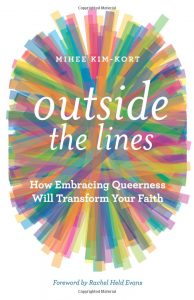 Outside the Lines: How Embracing Queerness will Transform Your Faith
Outside the Lines: How Embracing Queerness will Transform Your Faith
Author: Mihee Kim-Kort
Publisher: Fortress Press (2018)
Rachel Held Evans referred to this book as a “beautifully crafted work of hospitality” with “disarming vulnerability.” Kim-Kort, an ordained Presbyterian Church (USA) minister, writes that queerness is a term often met with contempt. She says it includes a posture of particularity and expansiveness, a playfulness of experimentation and the presence of the Holy Spirit in our imagination amidst a dynamic generosity, and a practice of ethics that is intentionally personal. Yet, she says these ethics are also social and political because they deal with the real-world humanity and dignity of people institutions oppose. By moving beyond the categories we’ve made, we can experience the love of God in ways we haven’t before.
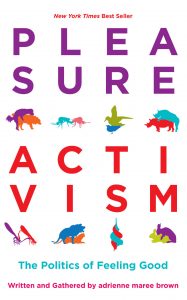 Pleasure Activism: The Politics of Feeling Good
Pleasure Activism: The Politics of Feeling Good
Author: Adrienne Marie Brown
Publisher: AK Press (2020)
Brown intends for her readers to embrace the curious freedom of pleasure by quieting the voices of shame and being liberated in a collective orientation toward “pleasure and longing.” She centers the stories and pleasure of Black women because they are the experiences she has lived in. And she shows how embracing “our full, complex selves” helps connect with self and neighbor. Brown believes imagination shapes our understanding and experience of an ever-changing world, and that transformative justice deals with the systemic assumptions that exile us from self and neighbor.
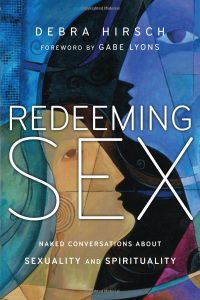 Redeeming Sex: Naked Conversations About Sexuality and Spirituality
Redeeming Sex: Naked Conversations About Sexuality and Spirituality
Author: Debra Hirsch
Publisher: InterVarsity Press (2015)
Winner of the 2015 Readers Choice Award and listed on Missio Alliance’s Essential Reading List of 2015, Redeeming Sex is an attempt to consider sexuality and spirituality in a converging conversation through Hirsch’s personal story. Hirsch says she tends to “hang out on the more traditional side of Christian sexual ethics” but has some unconventional views. Her concern is less about one’s position about sexuality and more with one’s posture toward it in a pursuit of being authentic without having a disembodied sexuality. While affirming Christians will take issue with Hirsch’s traditional views, reading this book can be helpful for traditional Christians to see a model of holding their convictions without having to convince everyone they’re right.
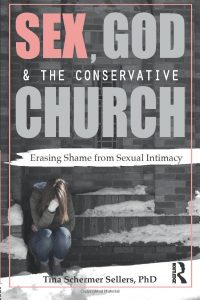 Sex, God, and the Conservative Church: Erasing Shame from Sexual Intimacy
Sex, God, and the Conservative Church: Erasing Shame from Sexual Intimacy
Author: Tina Schermer Sellers
Publisher: Routledge (2017)
Sellers is a licensed therapist and professor who is writing so other therapists can have a better understanding of how abstinence education and the evangelical purity movement have led to a culture of sexual shame and violence against women. She considers how Christian theology has created a dualistic hierarchy of the soul over the body, leading to abuse through the embrace of power and control rather than sexual health and wellness. In contrast, she shares stories of God inviting humanity into a powerful experience of intimate love that speaks to our value and worth. And she explores practical advice for how Christian parents can assist their children to develop their own sexual ethics and experience their sexuality as good.
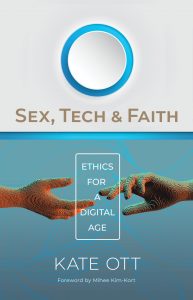 Sex, Tech, and Faith: Ethics for a Digital Age
Sex, Tech, and Faith: Ethics for a Digital Age
Author: Kate Ott
Publisher: Eerdmans (2022)
Ott rejects conversations about sexual ethics that focus on policies that disconnect us from ourselves and from one another. Instead, she embraces a Christian sexual ethic that equips people to engage in holistic, healthy sexual relationships that are faith-informed, reflective of sexual diversity, and that are based on erotic attunement and the values of curiosity, creativity, flexibility and care. She explores how these ethics might be lived out regarding such technologies as pornography, sexting, matchmaking apps, virtual reality, sex toys and sex robots. She writes in a way that leaves the reader informed, equipped and free to make their own decisions without being pressured toward any particular policy.
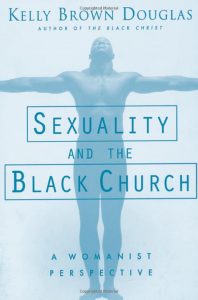 Sexuality and the Black Church: A Womanist Perspective
Sexuality and the Black Church: A Womanist Perspective
Author: Kelly B. Douglas
Publisher: Orbis Books (1999)
Responding to a critique by Renee Hill, who claimed Black women should recognize heterosexism and homophobia as oppression in order for all Black women to be liberated and empowered, Douglas admits Hill was right. Being touched by tragedy and learning to recognize her neighbors’ suffering, Douglas began to study the full spectrum of Black sexuality with the womanist goal of “survival and wholeness” for all. Beginning with questions, she seeks to understand why sexuality is “taboo,” to promote womanist approaches to sexuality, and to bring awareness to theology that could foster healthier attitudes and behaviors regarding sex. Her book deals with the root of Black theological silence and the impact of white culture and then develops a theology of Black sexuality that connects Jesus and human sexuality in the Black faith tradition.
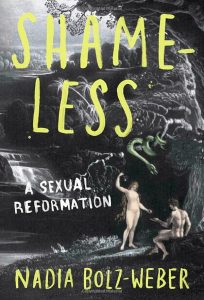 Shameless: A Sexual Reformation
Shameless: A Sexual Reformation
Author: Nadia Bolz-Weber
Publisher: Convergent Books (2019)
Much harm has been done by appealing to the creation stories in Genesis and making dogmatic rules about gender and sexuality roles and distinctions. Bolz-Weber writes her book for those who do not fit so easily into those strict binaries and for those who have been hurt by its theology and ethics. She sees the harm the church causes as greater than the harm culture causes because the church claims its message is from God. But rather than casting off the creation narratives, she reimagines them as stories of blessing and belonging that can heal the hurt we hold in our bodies.
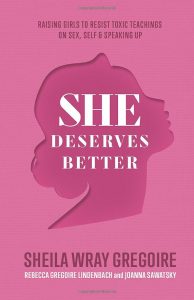 She Deserves Better: Raising Girls to Resist Toxic Teachings on Sex, Self, and Speaking Up
She Deserves Better: Raising Girls to Resist Toxic Teachings on Sex, Self, and Speaking Up
Authors: Sheila Wray Gregoire, Rebecca Lindenbach, Joanna Sawatsky
Publisher: Baker Books (2023)
For the past two decades, Gregoire has been writing about sex and marriage in mostly conservative to moderate evangelical spaces. Over time, her views began to evolve as she listened to stories and interviewed nearly 30,000 evangelical women to discover “much of the traditional evangelical advice actually leads to worse marriages and sex lives for women — not better.” She Deserves Better is an exploration of these dynamics and of alternative messages that could provide healthier and more enjoyable sex lives for evangelical women. Co-written with her daughter, Rebecca Lindenbach, and epidemiologist Joanna Sawatsky, She Deserves Better tells an honest and vulnerable story based on detailed research of how one can be involved with church communities while evolving your views toward healthier, more life-giving ethics over time when you’re courageous enough to consider whether your teaching really is good news for women.
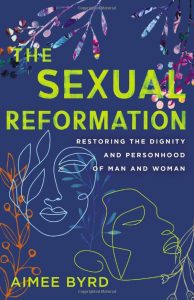 The Sexual Reformation: Restoring the Dignity and Personhood of Man and Woman
The Sexual Reformation: Restoring the Dignity and Personhood of Man and Woman
Author: Aimee Byrd
Publisher: Zondervan (2022)
Despite the fact that Byrd proposes a sexual reformation that maintains such traditionally conservative views as the federal headship of Adam as the first representative of all humanity and that she agrees with the morality of the Council on Biblical Manhood and Womanhood, she has taken the brunt of the criticism from conservative evangelical male scholars. Affirming Christians, and transgender people in particular, will take issue with some of the ways she describes transitioning. But despite how polarizing her writing may be across the spectrum, she demonstrates a deep knowledge from the inside about how complementarian men view the roles and personhood of men and women through a lens of power. Even those who disagree with her ethics could learn much from her knowledge of how this power is justified. And rather than being fixated on the past, she looks forward with an eschatological imagination many Christians who believe in a telos of reconciliation and wholeness could learn from.

Rick Pidcock
Rick Pidcock is a 2004 graduate of Bob Jones University, with a Bachelor of Arts degree in Bible. He’s a freelance writer based in South Carolina and a former Clemons Fellow with BNG. He recently completed a Master of Arts degree in worship from Northern Seminary. He is a stay-at-home father of five children and produces music under the artist name Provoke Wonder. Follow his blog at www.rickpidcock.com.

